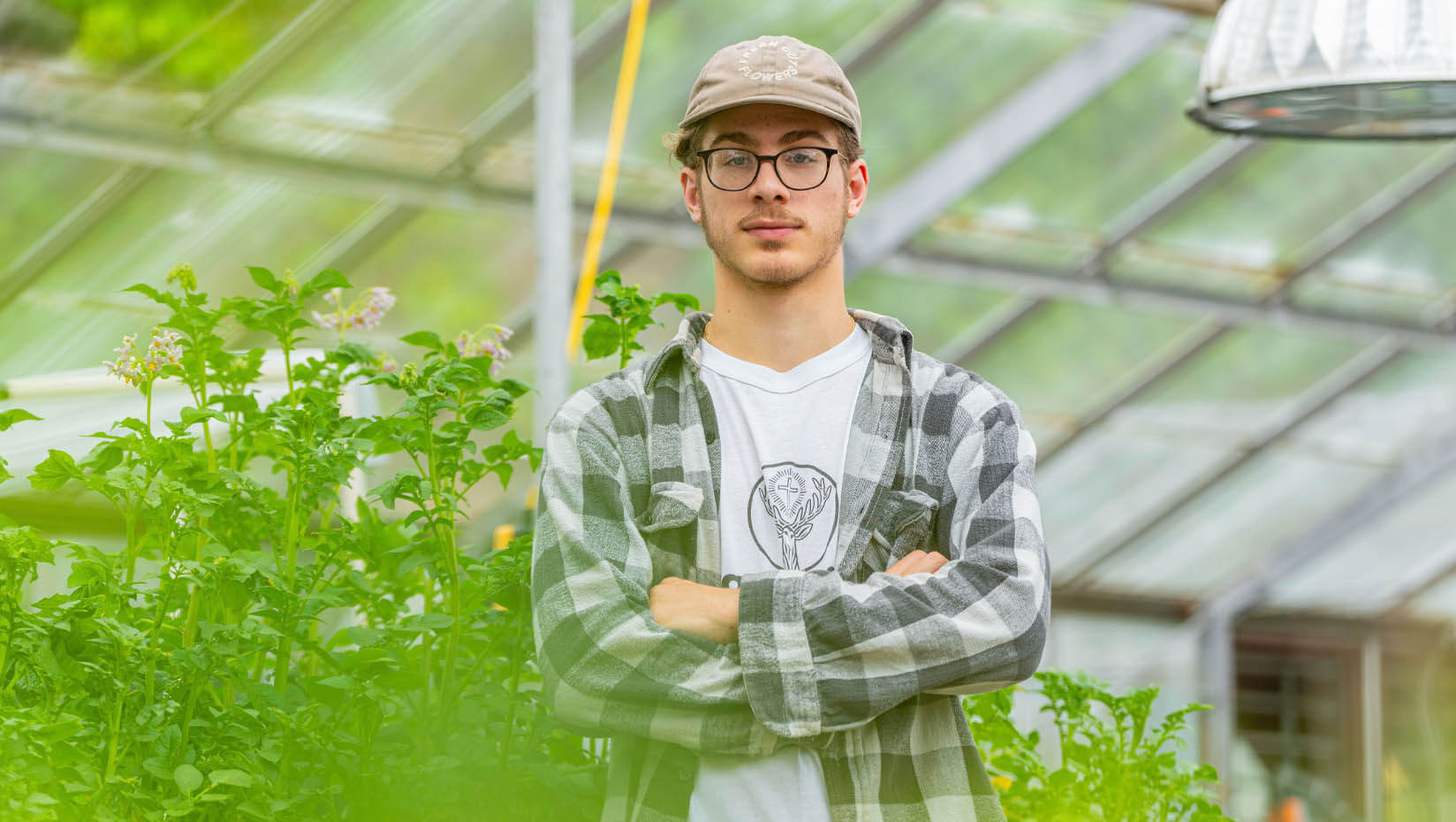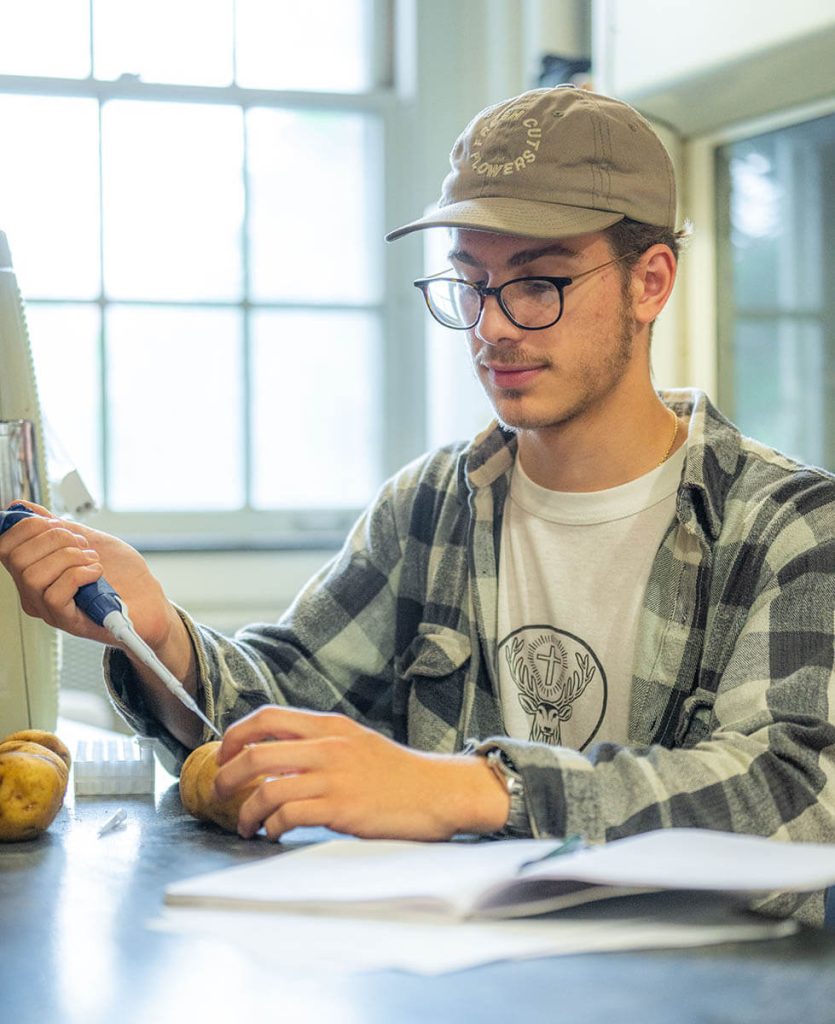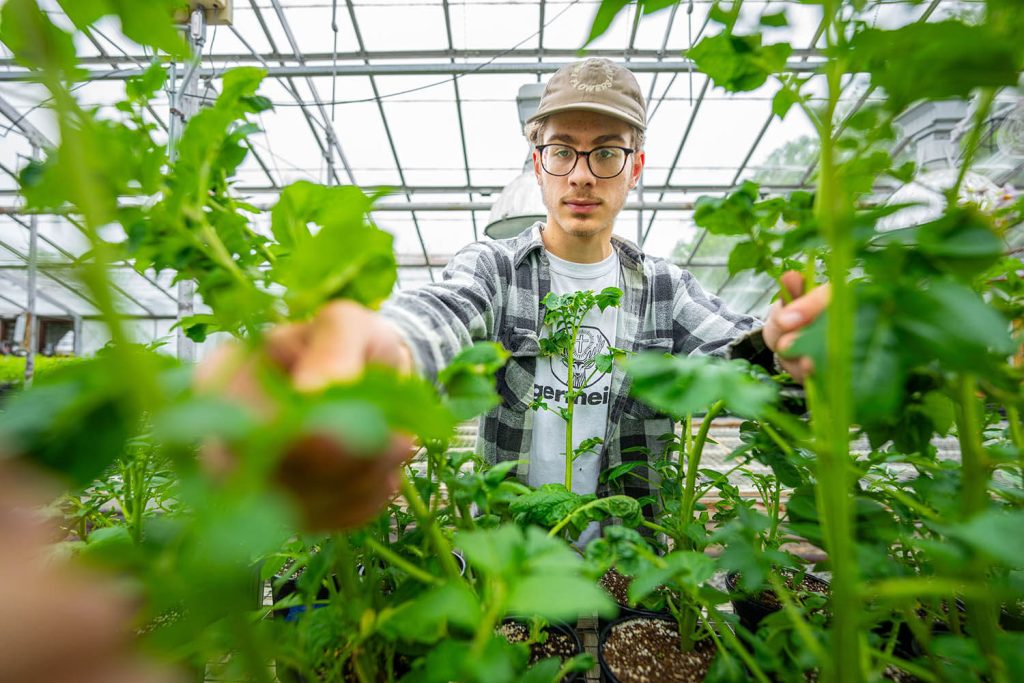
Will Kolbenson: From the greenhouse, to the lab, to the field
Will Kolbenson is spending his summer with spuds. Thanks to a statewide job creation program, the rising sophomore has taken his love for botany to a University of Maine lab to study potato pathogens, with work that takes him into the greenhouse and even into the field.
Prior to enrolling at UMaine, Kolbenson attended Academy for Science and Design in Nashua, New Hampshire. He developed an interest in botany after experimenting with growing succulents, which “opened up entire worlds around plants.” When he realized that the University of New Hampshire did not have a botany program, he applied to UMaine through the New England Board of Higher Education’s Reduced Tuition for New England Students program, which matches in-state tuition for certain degrees.
Kolbenson jumped right into the UMaine campus community his freshman year. He joined the Alpha Sigma Phi fraternity, where, he admits, he has a room full of plants, including aloes, a peperomia, an African violet and a small palm tree (his roommate sometimes grumbles about the balmy temperatures Kolbenson keeps the room at so the plants will thrive).
 Kolbenson was looking for summer jobs when his adviser, Michael Kinnison, sent along information about a research assistant position at associate professor Jay Hao’s plant pathology lab. The position was made possible thanks to funding from the Maine Jobs & Recovery Plan, provided by Governor Janet Mills and the Maine State Legislature to the University of Maine System for workforce development.
Kolbenson was looking for summer jobs when his adviser, Michael Kinnison, sent along information about a research assistant position at associate professor Jay Hao’s plant pathology lab. The position was made possible thanks to funding from the Maine Jobs & Recovery Plan, provided by Governor Janet Mills and the Maine State Legislature to the University of Maine System for workforce development.
Kolbenson rushed to apply. He didn’t have research experience, but was excited to absorb as much knowledge as he possibly could through working alongside graduate students in his chosen field of study.
Still, he didn’t know he would be working with potatoes until his first day.
“They’re pretty cool plants though,” Kolbenson says. “They’re very resilient. You can take a potato and stick it in the ground, and if you water it enough, it will grow.”
Kolbenson assists with a project comparing two different bacteria that impact potato plants: Dickeya, which causes potato black leg, and Pectobacterium, which causes potato tuber soft rot. The project looks at the propensity of these bacteria to cause disease, the evolution of the infection over time, co-infections that may occur and more.
Kolbenson spends most of his days in the greenhouse watering plants, injecting specimens with the pathogens and studying the way the disease impacts infected plants’ stems. He also conducts experiments in the lab about the temperature and growth rate of the bacteria in the lab.
“It’s an awesome opportunity for me to get lab experience this early,” Kolbenson says. “It’s been a great opportunity.”
Kolbenson works closely with Xiuyan Zhang, a Ph.D. student in plant pathology. Zhang says that Kolbenson is now independently leading the experiment on the relationship between temperature and bacterial pathogenicity.
“These research papers will be published before Will ends his summer work, and he will also serve as a co-author of them,” Zhang says. “I believe that this summer’s work experience will make him have better experiment design thinking, and also makes him special as an undergraduate student. I’m so glad to work with him.”

Kolbenson’s favorite part of the experience, though, has been the chance to go up to Aroostook Farm to plant potatoes at UMaine’s field experiment station.
“It is a lot harder work and longer days, but actually being outside in the field driving around in the trucks and planting the potatoes is pretty nice,” Kolbenson says. “When we do field trips, everybody helps everybody just to make it go quicker. There are a bunch of fields that need to be planted.”
As an added bonus, Kolbenson has had a chance to engage with his passion for ethnobotany, the relationships between cultures and plants, by engaging with the historical and cultural roots of potatoes in Maine through speaking with older farmers in Aroostook County.
Kolbenson says that the job has reinvigorated his love for science after a challenging freshman year of introductory courses. Before this summer, he even questioned whether he wanted to change his major, but after this experience, he knows he wants to stick with botany.
“I’ve learned way more through the hands-on than sitting through lectures. I would definitely like to work outside if possible, and the lab work is interesting, too,” Kolbenson says.
Contact: Sam Schipani, samantha.schipani@maine.edu
